German corporate lawyer turned horse trainer wins highly coveted lifetime gold medal in dressage
By Katie Harris
The Surveyor
It was 2 a.m. when the phone rang in Germany 17 years ago, forever changing the fate of Verena Diaz, a corporate lawyer and horse enthusiast who would go on to become a Berthoud dressage instructor and United States Dressage Federation gold medalist.
Diaz had all but forgotten her conversation with an American acquaintance to whom she’d mentioned she might like to come to the U.S. for a few weeks, until that critical morning months later, when the ringing of the phone announced an opportunity to live out her dream.
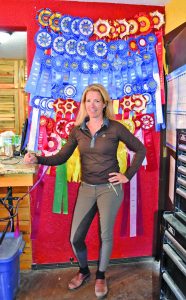
Berthoud trainer and instructor, Verena Diaz, has been training in Classical German Dressage for over 20 years, achieving some of the highest levels of recognition in the sport, including a lifetime gold medal from the United States Dressage Federation.
“It was a woman who had her own dressage business in Texas, and she asked if I wanted to come out and ride and train,” said Diaz. “That woman was the stepmother of my future husband.”
On a whim Diaz left her family and her job as an attorney behind and bought a plane ticket to America the next day. What was intended to be a brief stay in the U.S. proved to be permanent when Diaz was introduced to the woman’s stepson, a software engineer in Dallas, and the two wasted no time falling in love and deciding to start a family.
“I didn’t want to raise my kids in the concrete jungle so we looked around and said, ‘Yes, Colorado looks good,’” she said.
Landing in Lakewood, Diaz took a brief respite from the horse business, but soon found a true horse person can’t live without them. She met a woman from Berthoud who needed help with her two warmbloods, and before long the woman’s friend, and soon after, a neighbor, were calling on Diaz for lessons.
With the beginnings of a clientele established, Diaz and her husband put new roots down in Berthoud, west of town, on a 30-acre ranch they named “Pferdehof,” German for horse castle. The 14-stall barn, regulation size indoor arena, and multiple pastures proved to be just the place for Diaz to get her business boarding horses, training, and teaching lessons in classical German dressage up and running.
“Dressage originated in Europe, and the word ‘dressage’ is French for ‘training,’” explained Diaz. “In the lower levels, dressage is turning and stopping and slowing down – all the things you do in English riding when you’re not jumping off the ground. In the higher levels you look at strengthening the horse’s back and fine-tuning things, so that you can just shift your weight and the horse moves over.”
While dressage training can benefit any horse, it takes a special horse and rider to make it to the top in the sport. Diaz and her warmblood, Oban, did just that last year, achieving the rare lifetime gold medalist status from the United States Dressage Federation (USDF).
Winning a gold medal from the USDF is no easy feat. For starters, the horse used to compete must first achieve the highest level of dressage, Grand Prix, which requires natural talent and ability from the horse, expert training and skill from the rider, and years of success at competitions. According to Diaz, less than one percent of show horses achieve this status.
Horse and rider must then compete at the Grand Prix level, the same level in which Olympic dressage riders compete, earning high enough scores over the years to receive bronze, then silver, and finally, for a few top horse and rider duos each year, gold-medal status.
For Diaz the gold medal pinned to her show jacket is more than just a status symbol. It signifies the partnership between Oban and her.
“Dressage is a team sport,” she said. “Without your horse you’re nothing. If the horse isn’t working for you or doesn’t like you then you have nothing.”
According to Diaz, dressage, which has its roots in the cavalry, stemmed from the need for riders to guide their horses with their bodies in order to keep their hands free for fighting. From there it evolved into a sport, as the riders best able to control their horses with the slightest movements proved to be the best fighters.
“Dressage is so much fun because there’s no jerking and pulling and kicking and swinging; it’s just very soft and subtle aiding,” she said. “When you have your horse really in tune to you, you can just tighten one muscle and he goes where you want. That’s the goal.”
Having earned the gold medal she worked toward for so many years, Diaz has her sights set on the next big prize. She plans to begin competing in the Concours Dressage International (CDI) circuits in California and Florida, a series of shows recognized by the world governing body of equestrian sports, and including qualifying events for the Olympics.
As Diaz prepares to take her show life beyond the Rocky Mountain region, she says making time for her husband and two young sons, and spreading her love of dressage with her clients and the horses entrusted to her care at Pferdehof will remain her priorities.
“My client’s husband described it best,” said Diaz. “He said, ‘I’ve never seen a sport where someone works so hard to make it look like he’s not doing anything.’ When the horse and rider are one unit and all of a sudden they go sideways, or trot on the spot, but you didn’t see the rider do anything – when they’re that in sync, that’s when it’s beautiful to me.”
- April, 11 2024

Karspeck to serve third term as Berth...
By Will Cornelius The Surveyor On April 2, Berthoud voters re-elected Mayor Will Karspeck and...
- November, 19 2014
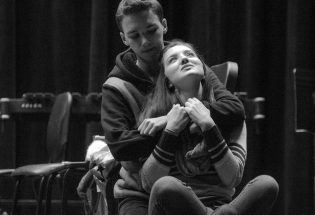
Berthoud High School presents ‘...
By John Gardner The Surveyor Brandon Sutorius, playing the...
- April, 09 2015
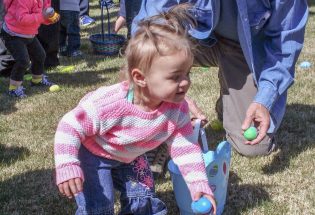
Let go my egg, yo
Approximately 2,500 kids between the ages of only a few months,...
- February, 27 2015
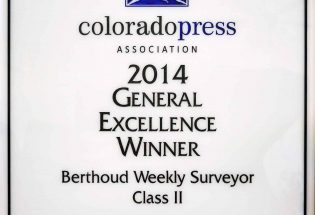
Surveyor wins top awards at annual co...
By Surveyor Staff Brenda Brandt presented the 2014 Editorial Writing award...
- September, 29 2017
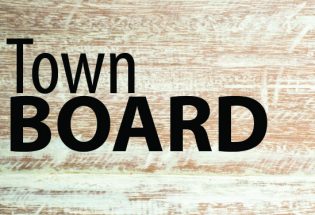
School district and Berthoud work tog...
Rudy Hemmann The Surveyor The Berthoud Board of Trustees held a regular business meeting Tuesday...
- June, 09 2016
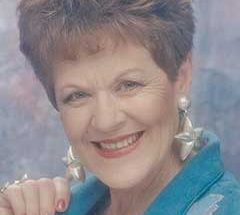
Marilyn Jean Krieger: July 11, 1935 &...
Marilyn Jean Krieger, 80, passed away Oct. 31, 2015. She was born on July 11,...

POLICEBLOTTER
Community News
Northern Water sets C-BT quota at 70% for 2024
Community News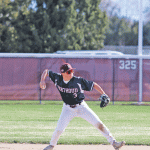

Emotions run high during Revere Property hearing
Community News
Snowpack at 119% above normal
Community News

Karspeck to serve third term as Berthoud mayor
Community News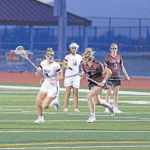

OPINION – No bitchin’ allowed
Community News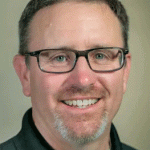
Roy Tripi to become principal of BHS on July 1
Community News
COMMUNITY CALENDAR:
Community Calendar – add an event
Homestead Fine Art Gallery First Fridays OPEN HOUSE
03 May 4:00 PM - 7:00 PM
Homestead Fine Art Gallery First Fridays OPEN HOUSE
07 Jun 4:00 PM - 7:00 PM
Homestead Fine Art Gallery First Fridays OPEN HOUSE
05 Jul 4:00 PM - 7:00 PM
Homestead Fine Art Gallery First Fridays OPEN HOUSE
02 Aug 4:00 PM - 7:00 PM
Homestead Fine Art Gallery First Fridays OPEN HOUSE
06 Sep 4:00 PM - 7:00 PM
Homestead Fine Art Gallery First Fridays OPEN HOUSE
04 Oct 4:00 PM - 7:00 PM

